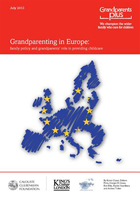Global Ageing

The World Health Organisation predicts that between 2000 and 2050, the number of people aged 60 and over is expected to double, with one in five people being aged 60 and over by 2050. By 2020, the number of people aged 60 and over will outnumber children under 5 years old. By 2050, 80% of older people will be living in low and middle-income countries.
Source: World Health Organisation
Whilst an ageing population the world over demonstrates success in dealing with childhood disease and maternal mortality, the pace and scale of global ageing means all countries will face the challenge of ensuring their health and social systems are prepared for this demographic transformation.
The Centre for Global Ageing at King's aims to increase our understanding in areas which will impact on ageing societies, specifically medical innovations for chronic conditions; families and communities, work, retirement and health.
An interdisciplinary project, the Centre brings together researchers from across the university as well as partnering other institutions and organisations. There are strong links between the Centre for Global Ageing and with projects in the areas of Global Palliative Care and Global Mental Health at King's.
 Research interests and partnerships
Research interests and partnerships
ATHLOS
The ATHLOS project aims to create a new definition of 'old age' based on many characteristics rather than just the classical chronological definition of age. The new definition will be used for calculating projections in each specific population and to guide policy recommendations.
Grandparenting in Europe
Grandparenting in Europe explores the role of grandparents within family life across the continent which makes a major contribution to our understanding of the demography of grandparenting and the role grandparents play in family life.
Lifepath
The overarching aim of the LIFEPATH project is to understand the determinants of diverging ageing pathways among individuals belonging to different socio-economic groups.
WHERL
Investigates ageing, work and health across the lifecourse, aiming to make a significant contribution to our understanding of the interactions between paid work and health, especially in later life.
 Research staff
Research staff
 Making an impact
Making an impact
Grandparenting in Europe
The report on grandparenting in Europe examined how different ‘grandparent policy regimes’ are related to levels of involvement of grandparents with their grandchildren in ten European countries.
The study revealed that grandparents faced increasing pressures not only to remain in paid employment themselves, but due the expense of childcare in many European countries, also to provide affordable childcare provision for their families.
The report highlighted the need for increased investment in affordable childcare and more flexible arrangements for working parents and grandparents.
 Education and training
Education and training
- Ageing & Society MSc, PGDip, PGCert
- Public Policy & Ageing MA, PGDip, PGCert
- Gerontology MSc, PGDip, PGCert

Find out more about the activities of the Centre for Global Ageing
05 July 2017